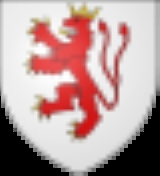
List of rulers of Lorraine
Encyclopedia
The rulers of Lorraine have held different posts under different governments over different regions. The first rulers of the region were kings of the Franks whose kingdom was called Lotharingia
. The Latin construction "Lotharingia" evolved over time into "Lorraine" in French, "Lotharingen" in Dutch and "Lothringen" in German. After the Carolingian
kingdom was absorbed into its neighbouring realms in the late ninth century, dukes were appointed over the territory. In the mid-tenth century, the duchy was divided into Lower Lorraine
and Upper Lorraine, the first evolving into the historical Low Countries
, the second became known as the Duchy of Lorraine and existed well into the modern era.
Charles the Bald claimed Lotharingia on Lothair's death and was crowned king in Metz
, but his brother Louis the German
opposed his claim and in 870 the Treaty of Mersen divided Lotharingia between the two brothers and subsequently their sons. In 880, the Treaty of Ribemont
gave the whole of Lotharingia to Louis the Younger, son of Louis the German.
In 922, Lotharingia was subsumed into the Kingdom of Germany
.
In 959, Lorraine was divided into two districts: Upper and Lower, each being given to a margrave
or vice-duke under Bruno. Upon Bruno's death in 965, that of Lower Lorraine, whose margrave had died, was left vacant until 977. In that year Charles
was appointed duke of Lower Lorraine and Frederick I was elevated duke in Upper Lorraine. The two duchies remained separate, following separate pathways, except for the brief period between 1033 and 1044.
House of Limburg
House of Leuven
House of Limburg
House of Leuven
Lotharingia
Lotharingia was a region in northwest Europe, comprising the Low Countries, the western Rhineland, the lands today on the border between France and Germany, and what is now western Switzerland. It was born of the tripartite division in 855, of the kingdom of Middle Francia, itself formed of the...
. The Latin construction "Lotharingia" evolved over time into "Lorraine" in French, "Lotharingen" in Dutch and "Lothringen" in German. After the Carolingian
Carolingian
The Carolingian dynasty was a Frankish noble family with origins in the Arnulfing and Pippinid clans of the 7th century AD. The name "Carolingian", Medieval Latin karolingi, an altered form of an unattested Old High German *karling, kerling The Carolingian dynasty (known variously as the...
kingdom was absorbed into its neighbouring realms in the late ninth century, dukes were appointed over the territory. In the mid-tenth century, the duchy was divided into Lower Lorraine
Lower Lorraine
The Duchy of Lower Lorraine or Lower Lotharingia , established in 959 was a stem duchy of the medieval German kingdom, which encompassed part of modern-day Belgium, the Netherlands, the northern part of the German Rhineland and a part of northern France east of the Schelde river.It was created out...
and Upper Lorraine, the first evolving into the historical Low Countries
Low Countries
The Low Countries are the historical lands around the low-lying delta of the Rhine, Scheldt, and Meuse rivers, including the modern countries of Belgium, the Netherlands, Luxembourg and parts of northern France and western Germany....
, the second became known as the Duchy of Lorraine and existed well into the modern era.
Kings of Lotharingia
- Lothair II (855–869)
Charles the Bald claimed Lotharingia on Lothair's death and was crowned king in Metz
Metz
Metz is a city in the northeast of France located at the confluence of the Moselle and the Seille rivers.Metz is the capital of the Lorraine region and prefecture of the Moselle department. Located near the tripoint along the junction of France, Germany, and Luxembourg, Metz forms a central place...
, but his brother Louis the German
Louis the German
Louis the German , also known as Louis II or Louis the Bavarian, was a grandson of Charlemagne and the third son of the succeeding Frankish Emperor Louis the Pious and his first wife, Ermengarde of Hesbaye.He received the appellation 'Germanicus' shortly after his death in recognition of the fact...
opposed his claim and in 870 the Treaty of Mersen divided Lotharingia between the two brothers and subsequently their sons. In 880, the Treaty of Ribemont
Treaty of Ribemont
There are two Treaties of Ribemont, the first is from 880 and the second is from 1179.-The treaty of 880:The Treaty of Ribemont in 880 was the last treaty on the partitions of the Frankish Empire...
gave the whole of Lotharingia to Louis the Younger, son of Louis the German.
- Charles the BaldCharles the BaldCharles the Bald , Holy Roman Emperor and King of West Francia , was the youngest son of the Emperor Louis the Pious by his second wife Judith.-Struggle against his brothers:He was born on 13 June 823 in Frankfurt, when his elder...
(869–870) - Louis the YoungerLouis the YoungerLouis the Younger , sometimes Louis III, was the second eldest of the three sons of Louis the German and Emma. He succeeded his father as the King of Saxony on 28 August 876 and his elder brother Carloman as King of Bavaria from 880...
(880–882) - Charles the FatCharles the FatCharles the Fat was the King of Alemannia from 876, King of Italy from 879, western Emperor from 881, King of East Francia from 882, and King of West Francia from 884. In 887, he was deposed in East Francia, Lotharingia, and possibly Italy, where the records are not clear...
(882–887) - Arnulf of CarinthiaArnulf of CarinthiaArnulf of Carinthia was the Carolingian King of East Francia from 887, the disputed King of Italy from 894 and the disputed Holy Roman Emperor from February 22, 896 until his death.-Birth and Illegitimacy:...
(887–895) - ZwentiboldZwentiboldZwentibold was the illegitimate son of the Carolingian Emperor Arnulf of Carinthia. In 895 his father, then king of East Francia, granted him the Kingdom of Lotharingia, which he ruled until his death.After his death he was declared a saint and martyr by the Catholic Church.- Life :Zwentibold...
(895–900) - Louis the ChildLouis the ChildLouis the Child , sometimes called Louis IV or Louis III, was the last Carolingian ruler of East Francia....
(900–911) - Charles the SimpleCharles the SimpleCharles III , called the Simple or the Straightforward , was the undisputed King of France from 898 until 922 and the King of Lotharingia from 911 until 919/23...
(911–922)
In 922, Lotharingia was subsumed into the Kingdom of Germany
Kingdom of Germany
The Kingdom of Germany developed out of the eastern half of the former Carolingian Empire....
.
Dukes of Lorraine
- Gebhard (903–910)
- ReginarReginar, Duke of LorraineReginar I Longneck was the Duke of Lorraine from 910 until his death. He stands at the head of the clan of Reginarids, an important Lotharingian noble family....
(910–915) - Gilbert (925–939)
- HenryHenry I, Duke of BavariaHenry I was Duke of Bavaria.He was the second son of the German King Henry the Fowler and his wife Matilda. He attempted a revolt against his older brother Otto I in 938 in alliance with Eberhard of Franconia and Giselbert of Lorraine, believing he had a claim on the throne. In 939 he was defeated...
(939–940) - OttoOtto, Duke of LorraineOtto was the Count of Verdun by inheritance and Duke of Lorraine by appointment of Otto I, Holy Roman Emperor. He was the son of Count Ricwin and the count's first wife, who was probably a Liudolfing...
(942–944) - Conrad (944–953)
- BrunoBruno I, Archbishop of CologneBruno the Great was Archbishop of Cologne, Germany, from 953 until his death, and Duke of Lotharingia from 954. He was the brother of Otto I, king of Germany and later Holy Roman Emperor....
(953–965)
In 959, Lorraine was divided into two districts: Upper and Lower, each being given to a margrave
Margrave
A margrave or margravine was a medieval hereditary nobleman with military responsibilities in a border province of a kingdom. Border provinces usually had more exposure to military incursions from the outside, compared to interior provinces, and thus a margrave usually had larger and more active...
or vice-duke under Bruno. Upon Bruno's death in 965, that of Lower Lorraine, whose margrave had died, was left vacant until 977. In that year Charles
Charles, Duke of Lower Lorraine
Charles of Lorraine was the son of Louis IV of France and Gerberga of Saxony and younger brother of King Lothair. He was a sixth generation descendant of Charlemagne...
was appointed duke of Lower Lorraine and Frederick I was elevated duke in Upper Lorraine. The two duchies remained separate, following separate pathways, except for the brief period between 1033 and 1044.
Matfriding dynasty
- Godfrey IGodfrey I, Duke of Lower LorraineGodfrey I was the count of Hainault from 958 and margrave or vice-duke of Lower Lorraine from 959, when that duchy was divided by Duke Bruno, who remained duke until his death in 965....
(959–964) - RicharRichar, Duke of Lower LorraineRichar was the count of Mons from 963 or 964 and vice-duke of Lower Lorraine from 968.After the death of Godfrey I, count of Hainault and vice-duke of Lower Lorraine, the Emperor Otto I gave Richar half of the county of Hainault with title of count of Hainault. The regions of Valenciennes was...
(968–972)
Carolingian dynasty
- CharlesCharles, Duke of Lower LorraineCharles of Lorraine was the son of Louis IV of France and Gerberga of Saxony and younger brother of King Lothair. He was a sixth generation descendant of Charlemagne...
(976–991) - OttoOtto, Duke of Lower LorraineOtto was the duke of Lower Lorraine from 993 until his death. He was the son of Charles, son of King Louis IV, and his first wife, a daughter of Robert de Vermandois, count of Meaux and Troyes....
(991–1012)
House of Ardennes–Verdun
- Godfrey IIGodfrey II, Duke of Lower LorraineGodfrey II , called the Childless, son of Godfrey I, Count of Verdun, was the count of Verdun from his father's death in 1002 and duke of Lower Lorraine after the death in 1012 of the Carolingian Otto, who left no sons....
(1012–1023) (also known as Godfrey I) - Gothelo I (1023–1044) (also duke of Upper Lorraine)
- Gothelo IIGothelo II, Duke of Lower LorraineGothelo II , variously called the Coward, the Sluggard, the Indolent, or the Lazy , has been often said to be Duke of Lower Lorraine after the death of his father Gothelo I, Duke of both Lower and Upper Lorraine until his own death in 1046.When Gothelo I died in 1044, Godfrey III, his eldest son,...
(1044–1046)
House of Ardennes–Verdun
- Godfrey IIIGodfrey III, Duke of Lower LorraineGodfrey III , called the Bearded, was the eldest son of Gothelo I, duke of Upper and Lower Lorraine. By inheritance, he was count of Verdun and he became margrave of Antwerp as a vassal of the duke of Lower Lorraine...
the Bearded (1065–1069) (also known as Godfrey II, also duke of Upper Lorraine) - Godfrey IVGodfrey IV, Duke of Lower LorraineGodfrey IV , known as the Hunchback, was a son of Godfrey the Bearded, whom he succeeded as duke of Lower Lorraine in 1069. His mother was Doda and his sister was Ida....
(1069–1076) (also known as Godfrey III)
House of Boulogne (Ardennes–Bouillon)
- Godfrey VGodfrey of BouillonGodfrey of Bouillon was a medieval Frankish knight who was one of the leaders of the First Crusade from 1096 until his death. He was the Lord of Bouillon, from which he took his byname, from 1076 and the Duke of Lower Lorraine from 1087...
(1087–1100) (also known as Godfrey IV)
House of Limburg 
- Henry IHenry, Duke of Lower LorraineHenry I was the count of Limburg and Arlon from 1082 to his death and duke of Lower Lorraine between 1101 to 1106. He was the son of Waleran I of Limburg and Jutta, daughter of Frederick, Duke of Lower Lorraine....
(1101–1106)
House of Leuven 
- Godfrey I of LeuvenGodfrey I of LeuvenGodfrey I , called the Bearded, the Courageous, or the Great, was the landgrave of Brabant, and count of Brussels and Leuven from 1095 to his death and duke of Lower Lorraine from 1106 to 1129...
(1106–1129) (also known as Godfrey V)
House of Limburg 
- WaleranWaleran, Duke of Lower LorraineWaleran II , called Paganus meaning "the Pagan", probably due to a late baptism, was the Duke of Limburg and Count of Arlon from his father's death in about 1119 until his own twenty years later...
(1129–1139)
House of Leuven 
- Godfrey II of LeuvenGodfrey II of LeuvenGodfrey II was the count of Leuven, landgrave of Brabant by inheritance from 23 January 1139. He was the son of Godfrey I and Ida of Chiny...
(1139–1142) (also known as Godfrey VI) - Godfrey III of LeuvenGodfrey III of LeuvenGodfrey III was count of Leuven , landgrave of Brabant, margrave of Antwerp, and duke of Lower Lorraine from 1142 to his death.He was the son of Godfrey II and Lutgarde of Sulzbach...
(1142–1190) (also known as Godfrey VII)
- Passes to the Duke of BrabantDuke of BrabantThe Duchy of Brabant was formally erected in 1183/1184. The title "Duke of Brabant" was created by the German Emperor Frederick Barbarossa in favor of Henry I, son of Godfrey III of Leuven . The Duchy of Brabant was a feudal elevation of the since 1085/1086 existing title of Landgrave of Brabant...
, who until 1795 kept the title "Duke of Lotharingia".
House of Ardennes-Bar
- Frederick IFrederick I, Duke of Upper LorraineFrederick I was the count of Bar and duke of Upper Lorraine. He was a son of Wigeric, count of Bidgau, also count palatine of Lorraine, and Cunigunda, and thus a sixth generation descendant of Charlemagne....
(959–978) - Thierry IThierry I, Duke of Upper LorraineTheodoric I was the count of Bar and duke of Upper Lorraine from 978 to his death. He was the son and successor of Frederick I and Beatrice, daughter of Hugh the Great, count of Paris, and sister to the French king Hugh Capet.His mother was the regent until 987...
(978–1026/1027) - Frederick IIFrederick II, Duke of Upper LorraineFrederick II , son of Thierry I and Richilde von Blieskastel, daughter of Folmar III, Count in Bliesgau; was the count of Bar and duke of Lorraine, co-reigning with his father from 1019....
(1026/1027) - Frederick IIIFrederick III, Duke of Upper LorraineFrederick III was the Count of Bar and Duke of Upper Lorraine from the death of his father, Frederick II, in 1026 or 1027 to his own death. His mother was Matilda, daughter of Herman II, Duke of Swabia....
(1026/1027–1033)
House of Ardennes-Verdun
- Gothelo (r. 1033–1044) (also duke of Lower Lorraine).
- Godfrey, the Bearded (r. 1044–1046) (also duke of Lower Lorraine)
House of Metz (Ardennes-Metz)
| Portrait | Name | Start term | End term | Note |
|---|---|---|---|---|
| Adalbert Adalbert, Duke of Lorraine Adalbert was the Duke of Upper Lorraine from 1047 until his death. He was the first son of Gerard de Bouzonville , Count of Metz, and Gisela .... |
1047 | 1048 | ||
| Gerhard | 1048 | 6 March 1070 | ||
| Thierry II Thierry II, Duke of Lorraine Theodoric II , called the Valiant, was the duke of Lorraine from 1070 to his death. He was the son and successor of Gerhard and Hedwige de Namur... |
6 March 1070 | 23 January 1115 | ||
| Simon I Simon I, Duke of Lorraine Simon I was the duke of Lorraine from 1115 to his death, the eldest son and successor of Thierry II and Hedwige of Formbach.... |
23 January 1115 | 13 April 1138 | ||
| Matthias I Matthias I, Duke of Lorraine Matthias I was the duke of Lorraine from 1138 to his death as the eldest son and successor of Simon I and Adelaide. Like his forefathers going back to Thierry II and even to Adalbert, he was a stern supporter of the king of Germany and Holy Roman Emperor... |
13 April 1138 | 13 May 1176 | ||
| Simon II Simon II, Duke of Lorraine Simon II was the Duke of Lorraine from 1176 to 1205. He was the son and successor of Matthias I and Judith, daughter of Frederick II, Duke of Swabia.... |
13 May 1176 | 1205 | ||
| Frederick I Frederick I, Duke of Lorraine Frederick I was the duke of Lorraine from 1205 to his death. He was the second son of Matthias I and Judith, daughter of Frederick II, Duke of Swabia. He succeeded his brother, Simon II, who had already given him the county of Bitche in 1176 and had recognised him over the northern, germanophone... |
1205 | 7 April 1206 | ||
| Frederick II Frederick II, Duke of Lorraine Frederick II was the duke of Lorraine from 1206 to his death, son of Frederick I and Ludmilla, daughter of Mieszko III the Old, of the Piast Dynasty.... |
7 April 1206 | 10 October 1213 | ||
| Theobald I Theobald I, Duke of Lorraine Theobald I was the duke of Lorraine from 1213 to his death. He was the son and successor of Frederick II and Agnes of Bar.... |
10 October 1213 | 17 February 1220 | ||
| Matthias II Matthias II, Duke of Lorraine Matthias II was Duke of Lorraine from 1220 to his death. He was the son of Duke Frederick II and Agnes of Bar and succeeded his brother, Theobald I.... |
17 February 1220 | 24 June 1251 | ||
| Frederick III Frederick III, Duke of Lorraine Frederick III was the Duke of Lorraine from 1251 to his death. He was the only son and successor of Matthias II and Catherine of Limburg.... |
24 June 1251 | 31 December 1302 | ||
| Theobald II Theobald II, Duke of Lorraine Theobald II was the duke of Lorraine from 1303 to his death. He was the son and successor of Frederick III and Margaret, daughter of King Theobald I of Navarre.... |
31 December 1302 | 13 May 1312 | ||
| Frederick IV Frederick IV, Duke of Lorraine Frederick IV , called the Fighter, was the Duke of Lorraine from 1312 to his death.-Biography:Frederick was born in Gondreville, the son and successor of Theobald II and Isabella of Rumigny.... |
13 May 1312 | 23 August 1328 | ||
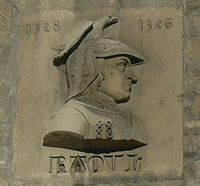 |
Raoul Rudolph, Duke of Lorraine Rudolph , called the Valiant , was the Duke of Lorraine from 1329 to his death. He was the son and successor of Frederick IV and Elisabeth, daughter of Albert I of Germany, a Habsburg, whence his name... |
23 August 1328 | 26 August 1346 | killed at the Battle of Crécy Battle of Crécy The Battle of Crécy took place on 26 August 1346 near Crécy in northern France, and was one of the most important battles of the Hundred Years' War... |
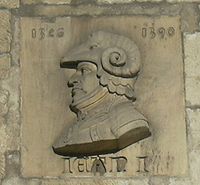 |
John I John I, Duke of Lorraine John I was the duke of Lorraine from 1346 to his death. As an infant of six months, he succeeded his father, Rudolph, who was killed in the Battle of Crécy. His mother was Mary, daughter of Guy I of Blois.... |
26 August 1346 | 27 September 1390 | |
| Charles II Charles II, Duke of Lorraine Charles II , called the Bold was the duke of Lorraine from 1390 to his death and constable of France from 1418 to 1425.... |
27 September 1390 | 25 January 1431 | ||
| Isabella Isabella, Duchess of Lorraine Isabella was suo jure Duchess of Lorraine, from 25 January 1431 to her death in 1453. She was the first wife of Duke Rene of Anjou, King of Naples, and the mother of his children, which included Margaret of Anjou, Queen consort of England as the wife of Henry VI.From 1435 to 1442, Isabella was... |
25 January 1431 | 28 February 1453 | with her husband, René I |
House of Anjou
| Portrait | Name | Start term | End term | Note |
|---|---|---|---|---|
| René I | 25 January 1431 | 28 February 1453 | with his wife, Isabella Isabella, Duchess of Lorraine Isabella was suo jure Duchess of Lorraine, from 25 January 1431 to her death in 1453. She was the first wife of Duke Rene of Anjou, King of Naples, and the mother of his children, which included Margaret of Anjou, Queen consort of England as the wife of Henry VI.From 1435 to 1442, Isabella was... |
|
| John II John II, Duke of Lorraine John II of Anjou was Duke of Lorraine from 1453 to his death. He inherited the duchy from his mother, Duchess Isabelle, during the life of his father, Duke René of Anjou, also Duke of Lorraine and titular king of Naples... |
28 February 1453 | 16 December 1470 | ||
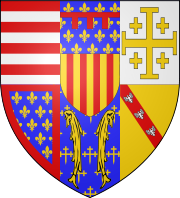 |
Nicholas I Nicholas I, Duke of Lorraine Nicholas of Anjou was the son of John II, Duke of Lorraine and Marie de Bourbon.He succeeded his father in 1470 as Duke of Lorraine, and assumed the titles of Marquis of Pont-à-Mousson, Duke of Calabria, and Prince of Girona, as heir apparent of Bar, Naples, and Aragon respectively.He did not... |
16 December 1470 | 24 July 1473 |
House of Lorraine
Junior branch of the previous rulers of Ardennes–Metz, known as the House of Lorraine| Portrait | Name | Start term | End term | Note |
|---|---|---|---|---|
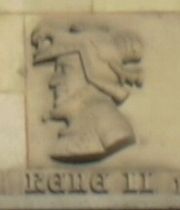 |
René II René II, Duke of Lorraine René II was Count of Vaudémont from 1470, Duke of Lorraine from 1473, and Duke of Bar from 1483 to 1508. He claimed the crown of the Kingdom of Naples and the County of Provence as the Duke of Calabria 1480–1493 and as King of Naples and Jerusalem 1493–1508... |
24 July 1473 | 10 December 1508 | grandson of René I and Isabella; also Duke of Bar |
 |
Antoine Antoine, Duke of Lorraine Antoine , known as the Good, was Duke of Lorraine from 1508 until his death in 1544.-Biography:Antoine was born at Bar-le-Duc, the son of René II, Duke of Lorraine and Philippa of Guelders... |
10 December 1508 | 14 June 1544 | |
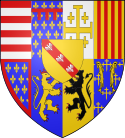 |
Francis I Francis I, Duke of Lorraine Francis I was a member of the French nobility. He was briefly Duke of Lorraine from 1544–1545.-History:... |
14 June 1544 | 12 June 1545 | |
| Charles III Charles III, Duke of Lorraine Charles III , known as the Great, was Duke of Lorraine from 1545 until his death.-History:He was the eldest surviving son of Francis I, Duke of Lorraine, and Christina of Denmark... |
12 June 1545 | 14 May 1608 | ||
| Henry II | 14 May 1608 | 31 July 1624 | ||
| Nicole | 31 July 1624 | 25 November 1625 | she was the daughter of Henry I; the estates of Lorraine eventually decided that she was not eligible to reign, and gave the crown to her uncle, Francis II; her husband and first cousin, Charles IV, would reign thereafter | |
 |
Francis II Francis II, Duke of Lorraine Francis II , was the son of Charles III, Duke of Lorraine and Claude of Valois. He was Duke of Lorraine briefly in 1624, quickly abdicating in favour of his son.-Biography:... |
25 November 1625 | 1 December 1625 | he immediately abdicated in favor of his son, Charles IV; died 1632 |
| Charles IV Charles IV, Duke of Lorraine Charles IV was Duke of Lorraine from 1624 to 1634, when he abdicated under French pressure in favor of his younger brother, and again from 1661 until 1675.- Biography :... |
1 December 1625 | 19 January 1634 | abdicated in favor of his brother | |
| Nicholas II Nicholas II, Duke of Lorraine Nicholas Francis , also known as Nicholas II, was briefly Duke of Lorraine and Duke of Bar for a few months in 1634, spanning the time between the abdication of his older brother and his own resignation... |
19 January 1634 | 1 April 1634 | fled into exile and abdicated in favour of his older brother; the duchy remained under effective French control for the next 27 years | |
| Charles IV Charles IV, Duke of Lorraine Charles IV was Duke of Lorraine from 1624 to 1634, when he abdicated under French pressure in favor of his younger brother, and again from 1661 until 1675.- Biography :... |
1 April 1634 | 18 September 1675 | nominally restored as a result of his brother's abdication; Lorraine was occupied by France, and the Duke in exile, from 1634 to 1661 and again from 1670 until his death | |
| Charles V Leopold Charles V, Duke of Lorraine Charles V , Karl V. Leopold, , son of Nicolas François, Duke of Lorraine, and Claude Françoise de Lorraine. Karl Leopold was born in Vienna and became the brother in law of Emperor Leopold and son in law of emperor Ferdinand III... |
18 September 1675 | 18 April 1690 | He was in exile and Lorraine was occupied by France throughout his nominal reign | |
| Leopold Leopold, Duke of Lorraine Leopold , surnamed the Good, was Duke of Lorraine and Bar from 1690 to his death.-Early life:Leopold Joseph Charles Dominique Agapet Hyacinthe was the son of Charles V, Duke of Lorraine, and his wife Eleonora Maria Josefa of Austria, a half-sister of Leopold I, Holy Roman Emperor.At the time of... |
18 April 1690 | 27 March 1729 | He was in exile and Lorraine was occupied by France until 30 October 1697, when it was returned to Léopold Joseph; it was again occupied by France from 1702 to 1714, although the duke remained in place | |
| Francis III Stephen Francis I, Holy Roman Emperor Francis I was Holy Roman Emperor and Grand Duke of Tuscany, though his wife effectively executed the real power of those positions. With his wife, Maria Theresa, he was the founder of the Habsburg-Lorraine dynasty... |
27 March 1729 | 9 July 1737 | traded Lorraine in exchange for the Grand Duchy of Tuscany Grand Duchy of Tuscany The Grand Duchy of Tuscany was a central Italian monarchy that existed, with interruptions, from 1569 to 1859, replacing the Duchy of Florence. The grand duchy's capital was Florence... ; elected Holy Roman Emperor Holy Roman Emperor The Holy Roman Emperor is a term used by historians to denote a medieval ruler who, as German King, had also received the title of "Emperor of the Romans" from the Pope... in 1745; died 1765, husband of Empress Maria Theresa |
House of Leszczyński
| Portrait | Name | Start term | End term | Note |
|---|---|---|---|---|
| Stanislaus | 9 July 1737 | 23 February 1766 | former king of Poland. After him, the Duchy is inherited by his son-in-law, king Louis XV of France Louis XV of France Louis XV was a Bourbon monarch who ruled as King of France and of Navarre from 1 September 1715 until his death. He succeeded his great-grandfather at the age of five, his first cousin Philippe II, Duke of Orléans, served as Regent of the kingdom until Louis's majority in 1723... and incorporated in his dominions |

